Politics
Trump willing to meet Putin without prior talks with Zelensky
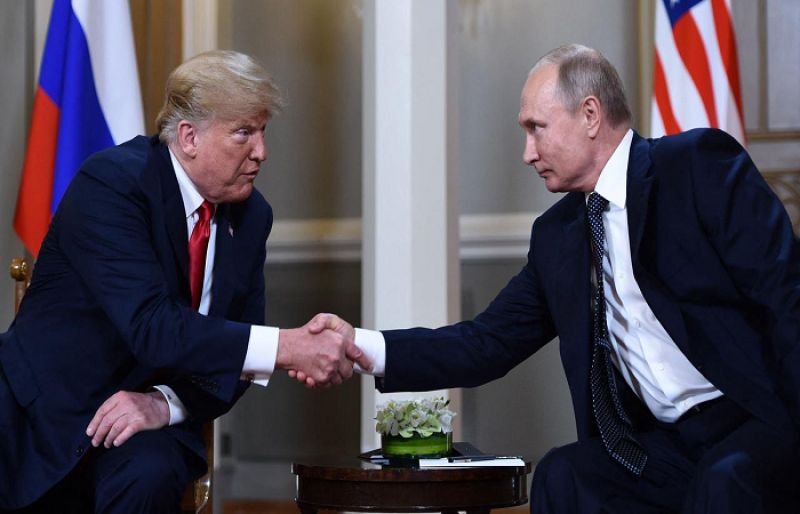

U.S. President Donald Trump has expressed his willingness to meet Russian President Vladimir Putin to discuss the Ukraine conflict, even if Putin has not first held talks with Ukrainian President Volodymyr Zelensky.
This statement signals a departure from Trump’s earlier position, which required a meeting between Putin and Zelensky as a prerequisite for any direct engagement with the Kremlin.
Trump has set a Friday deadline for Moscow to agree to a ceasefire in Ukraine, warning of additional sanctions if the demand is not met.
However, when asked by reporters in the Oval Office whether that deadline still stands, Trump gave an ambiguous response.
“That’s going to be up to him (Putin),” he said. “We’ll see what he has to say.”
Since his return to the White House in January, Trump has increased pressure on Russia to end its military offensive against Ukraine.
The Kremlin said Thursday that Putin was set to attend a summit with Trump in the “coming days”, but the Russian leader essentially ruled out including Zelensky.
On Thursday, Zelensky insisted that he had to be involved in any talks.
When Trump was asked if Putin was required to meet Zelensky before a summit, the US president said simply: “No, he doesn’t.”
Putin has named the United Arab Emirates as a potential location for the summit, but this was not confirmed by Washington.
The summit would be the first between sitting US and Russian presidents since Joe Biden met Putin in Geneva in June 2021.
Three rounds of direct Russia–Ukraine talks in Istanbul have failed to yield any progress towards a ceasefire. The two sides remain far apart on the conditions they have set to end the more than three-year-long conflict.
Trump and Putin last sat together in 2019 at a G20 summit meeting in Japan during Trump’s first term.
They have spoken by telephone several times since the tycoon returned to the White House this year.
Kremlin aide Yuri Ushakov said that “next week has been set as a target date”, adding that both sides have agreed the venue “in principle”, without naming it.
However, Washington later denied that a venue or date had been set.
“No location has been determined,” a White House official said, while agreeing that the meeting “could occur as early as next week.”
Tens of thousands of people have been killed since Russia launched its military offensive on Ukraine in February 2022.
Russian bombardments have forced millions of people to flee their homes and have destroyed swathes of eastern and southern Ukraine.
Putin has resisted multiple calls from the United States, Europe and Kyiv for a ceasefire.
At talks in Istanbul, Russian negotiators outlined hardline territorial demands for halting its advance — calling for Kyiv to withdraw from some territory it still controls and to renounce Western military support.
Reports of the possible summit came after US special envoy Steve Witkoff met Putin in Moscow on Wednesday.
Witkoff proposed a trilateral meeting with Zelensky, but Putin appeared to rule out direct talks with the Ukrainian leader.
“Certain conditions must be created for this,” Putin told reporters. “Unfortunately, we are still far from creating such conditions.”
The former KGB agent, who has ruled Russia for over 25 years, said in June that he was ready to meet Zelensky, but only during a “final phase” of negotiations on ending the conflict.
In his regular evening address on Thursday, Zelensky said “it is only fair that Ukraine should be a participant in the negotiations.”
The Ukrainian leader spoke with French President Emmanuel Macron, German Chancellor Friedrich Merz and the European Commission President Ursula von der Leyen as he called for the continent to be included in any potential peace talks.
“Ukraine is an integral part of Europe — we are already in negotiations on EU accession.
Therefore, Europe must be a participant in the relevant processes,” Zelensky said on social media after the conversation with Merz.
He also said that Ukrainian, European and US security advisers would hold an online meeting on Thursday “to align our joint views.”
“Ukraine is not afraid of meetings and expects the same brave approach from the Russian side. It is time we ended the war,” he said.
Politics
Key Iranian figures martyred in US-Israel military strikes
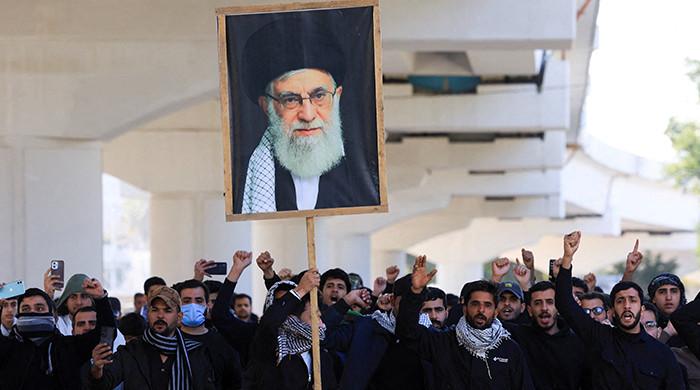
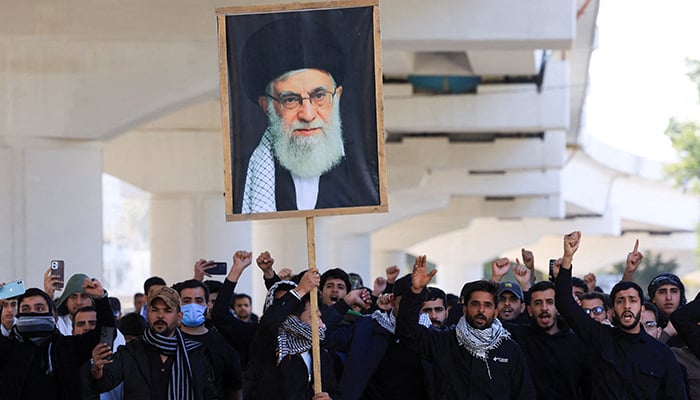
A number of Iranian senior leaders, including Supreme Leader Ayatollah Ali Khamenei, have embraced martyrdom in the “unprovoked and unwarranted” airstrikes by Israel and the United States.
As crowds gathered in Tehran, explosions rang out, and the Israeli military announced that it was again striking targets in the heart of the city — as more blasts were heard in Jerusalem, Riyadh, Dubai, Doha and Manama.
Iran’s President Masoud Pezeshkian declared Khamenei’s assassination a “declaration of war against Muslims” and warned: “Iran considers it its legitimate duty and right to avenge the perpetrators and masterminds of this historic crime.”
Iranian state media have confirmed the killing of several senior figures:
1. Ayatollah Ali Khamenei, supreme leader of Iran
2. Ali Shamkhani, representative of the Supreme Leader in the Supreme Defence Council
3. General Abdolrahim Mousavi, Iran’s Armed Forces chief of staff
4. Major General Mohammad Pakpour, commander-in-chief of the Islamic Revolution Guards Corps (IRGC)
5. Aziz Nasirzadeh, Minister of Defence
6. Gholamreza Rezaian, police intelligence chief of Iran
Separately, the daughter, son-in-law, and granddaughter of Ali Khamenei also embraced martyrdom in the US and Israeli airstrikes.
Politics
Iran to continue acting in self-defense until enemy’s aggression ends: UN envoy
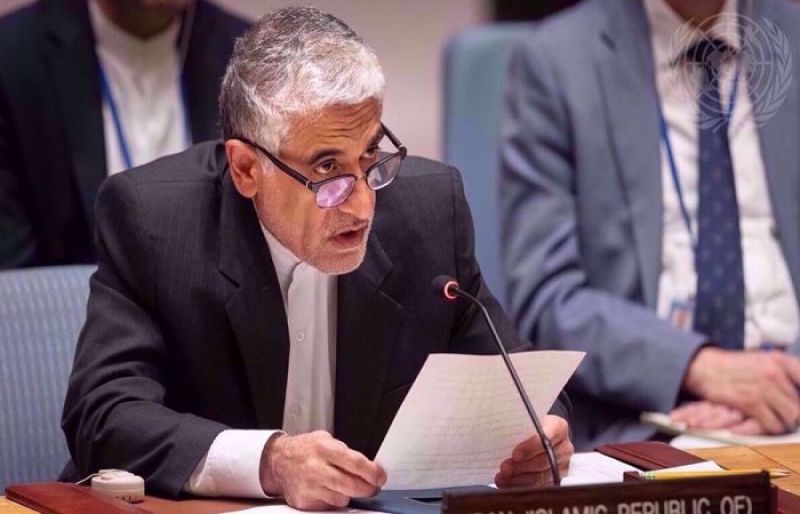

Iran’s permanent ambassador to the United Nations has vehemently denounced the fresh and unprovoked Israeli-American war on the Islamic Republic, asserting that the country will continue to act in self-defense until the end of the unlawful aggression.
Amir-Saeid Iravani made the remarks at a UN Security Council meeting on Sunday regarding the joint strikes that were launched against the country earlier on Saturday.
The nation, he stated, was facing armed aggression and a war against international law, which could not be justified by any excuse.
Referring to Iran’s decisive and ongoing retaliatory strikes, under the codename Operation True Promise 4, the envoy said it serves as a legitimate act of self-defense.
The Islamic Republic would continue to exercise its legitimate right to self-defense until the aggression ends, Iravani told the world body.
The Islamic Revolution Guards Corps (IRGC) has so far launched at least five waves of counterstrikes against numerous Israeli and American targets in response to the aggression.
IRGC has pledged to sustain the counterstrikes until the enemies’ “complete defeat,” while noting that the reprisal exceeds by far the proportions of its previous round of retaliations against Tel Aviv’s and Washington’s imposed war on the nation last June.
Addressing the same meeting, Russia’s UN envoy said Iran had been once again “stabbed in the back,” referring to the country’s coming under fresh aggression, while engaging in indirect talks with the United States aimed at resolving standing issues.
Vasily Nebenzya condemned an attack on a school in Iran that took place as part of the renewed aggression, claiming the lives of more than 100 people, calling it a sign of “unjustified aggression” by the Israeli regime and the United States against a UN member state.
He described the atrocities as “unjustifiable” and a “betrayal of diplomacy.”
Politics
Blast at India explosives factory kills 17
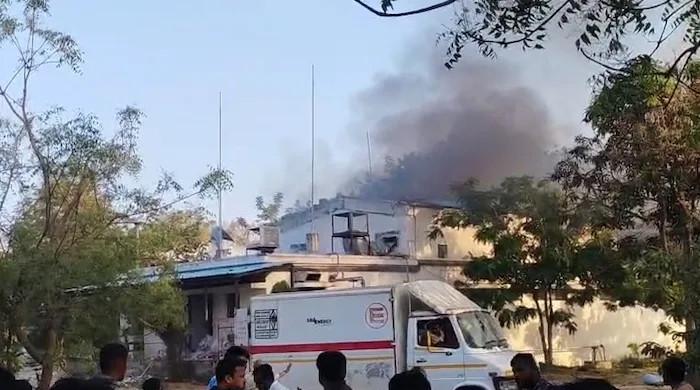

- PM Modi describes accident as “deeply distressing”.
- Maharashtra CM terms it “extremely unfortunate.”
- Industrial accidents are common in India.
A blast at an explosives factory killed at least 17 people and injured 18 others on Sunday, officials in the western Indian state of Maharashtra said.
Prime Minister Narendra Modi said the accident was “deeply distressing” and wished a speedy recovery to the survivors.
Maharashtra state chief minister Devendra Fadnavis called the incident “extremely unfortunate and tragic” in a post on X.
The accident happened in Nagpur, about 800 kilometres (500 miles) from state capital Mumbai.
“Rescue operations have been accelerated, and so far, 17 people have lost their lives,” Fadnavis said, adding 18 others were injured.
An investigation has been ordered into the incident.
On Saturday, 21 people were killed in an explosion at a firecracker factory in the southeastern Indian state of Andhra Pradesh.
Industrial accidents are common in India, often due to disregard for safety requirements and lax enforcement.
Last year, a firework factory explosion in western India killed 21 people.
-

 Business1 week ago
Business1 week agoUS Top Court Blocks Trump’s Tariff Orders: Does It Mean Zero Duties For Indian Goods?
-

 Fashion1 week ago
Fashion1 week agoICE cotton ticks higher on crude oil rally
-

 Entertainment1 week ago
Entertainment1 week agoThe White Lotus” creator Mike White reflects on his time on “Survivor
-

 Politics1 week ago
Politics1 week agoPakistan carries out precision strikes on seven militant hideouts in Afghanistan
-

 Business1 week ago
Business1 week agoEye-popping rise in one year: Betting on just gold and silver for long-term wealth creation? Think again! – The Times of India
-

 Sports1 week ago
Sports1 week agoBrett Favre blasts NFL for no longer appealing to ‘true’ fans: ‘There’s been a slight shift’
-

 Sports1 week ago
Sports1 week agoKansas’ Darryn Peterson misses most of 2nd half with cramping
-
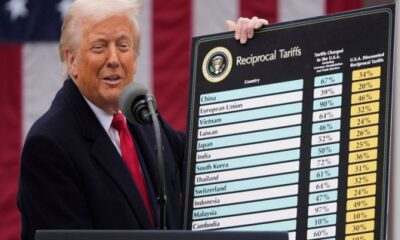
 Politics1 week ago
Politics1 week agoUS Supreme Court strikes down Trump’s trade tariff measures






